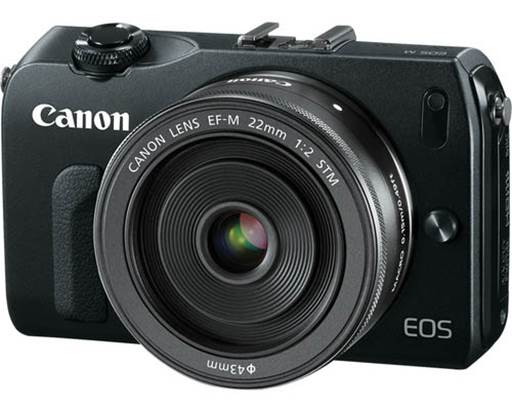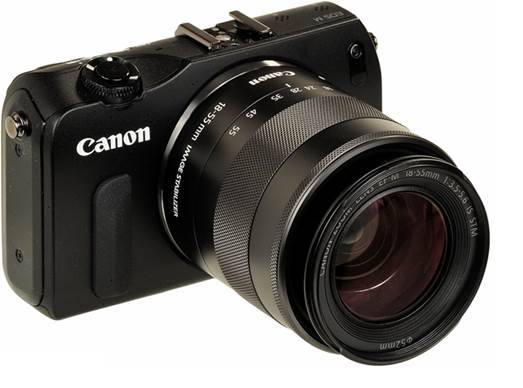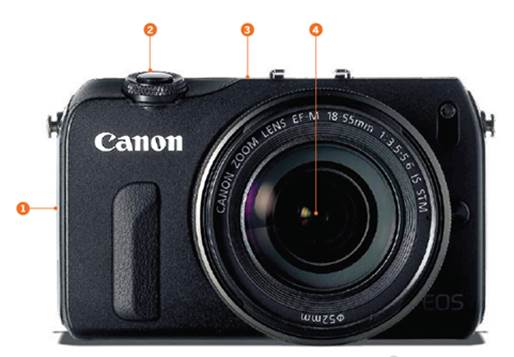Canon EOS M: $882
Canon’s debut compact system cam shoots! It
scores!
Canon has taken its own sweet time in
joining the fray, but the EOS M is worth the wait. With styling that apes the
PowerShot range of compacts rather than a DSLR, it offers an approachably
familiar control layout for anyone upgrading. It handles well too, with
construction that pulls off the trick of feeling both lightweight and built to
last.

Canon
EOS M
Also in its favor is the fact that this is
the most compact camera in its class to feature a larger-than-average
18-megapixel APS-C sensor, delivering the image quality of a DSLR. Using the
18-55mm kit lens we were very impressed with the razor-sharp and color-rich
pictures. Output is also consistent from shot to shot. That said, autofocus
could do with being faster, especially if you are not fond of manual.
Full-HD video shoots at 25fps and it’s easy
to quickly begin recording using the mode dial. More creative features can be
found squirreled away within menu screens, accessed via the three-inch touch
LCD.
The other main selling point, and a major
point in Canon’s favor, is the 70-strong EOS range of lenses that are
compatible with the EOS M via the EF-EOS M adaptor. That’s some serious
versatility.
There are certain aspects of the EOS M
we’re not so crazy about. For starters there’s the handgrip, which has been
reduced to a narrow strip at the front, making the lack of in-body
stabilization more problematic, especially if you’ve attached a bulkier lens
via the adaptor. The battery life of 230 shots also falls short of the 300+
pics rivals achieve.

Using
the 18-55mm kit lens we were very impressed with the razor-sharp and color-rich
pictures
Despite that, for existing Canon users
looking for a smaller alternative, this is a must. It lacks some of the more
innovative features on test, but wins out with always-reliable shots. Quality
Details
1. Screen: The touchscreen’s menus contain a treasure trove of creative
camera settings
2. Controls: Approachable control layout mirrors Canon’s PowerShot
compacts
3. Video: Record full-HD with stereo mics for decent audio
4. Kit lens: A capable 18-55mm lens with stabilized zoom

Details
Accessorize: Canon EF-M and EF lenses
There are currently only two EF-M compact
lenses, the kit lens bundled, plus a 22mm pancake lens. However, attach the
EF-EOS M adaptor ($132.5) and you can use Canon’s 70+ EF series lenses designed
for DSLRs.
The verdict
Love: Large sensor delivers superb pics.
Lightweight yet solid build. Wealth of compatible lenses
Hate: No handgrip. No viewfinder. No Wi-Fi
connectivity. No built-in flash. AF speed
T3 Says: Canon’s first compact system cam
is a winner, delivering A-grade photographic results
Rating: 4/5
Canon EOS M Specifications
·
Sensor: 18-megapixel 22.3x14.9mm CMOS
·
Video: 1920x1080 at 25fps kit
·
Lens: 18-55mm lens
·
Lens mount: EF-M screen 3-inch touchscreen,
1040k-dot LCD
·
Formats: JPEG, RAW, RAW+JPEG
·
ISO range: 100-12,800
·
Battery life: 230 shots
·
Dimensions: Height: 66mm; Width: 108mm;
Depth: 32mm; Weight: 298g
Reasons: Why the Canon EOS M is our test winner…
1. The same CMOS sensor used in Canon’s EOS DSLRs means image quality
well above average.
2. Add the EF-EOS M mount adaptor (costs extra) for a massive range of
lenses.
3. A three-inch touchscreen makes operation simple, with easily
accessible menus and settings.
4. One of the most compact interchangeable lens cameras and one of the
lightest at just 298g.
5. Clip-on flash is provided, but ISO can be bumped up to 25,600 for flashness
low-light shooting.
6. Compatible with Canon’s Speedlite flashguns via the hot shoe.
7. Stainless steel and magnesium alloy build is super durable.
8. 1080p video can be captured at up to 30fps for up to half an hour.
9. Switch off and the EOS M performs an automatic sensor cleansing, so
dust will never affect the quality of your shots.
Focus: Bijou bags for your compact
system cam
Case logic CHC-1
Holster-style neoprene case with quick
access top flap plus soft innards for protection. Internal pouch stores lens
cap. $21
Lowepro Streamline 100
Fitted bag for compact cams with a 14 - 45
mm lens. Also has space for another lens and zippered pockets for personal IDs.
$34.5
Manfrotto Stile Nano VII
Italian-made pouch for your smaller compact
system cam, replete with water-repellent coating. $16.5
Think tank retrospective 5
An understated messenger bag that can house
a system cam plus three to six lenses. $133.5
Final word: Get the full picture…
It took a surprisingly long time for Canon
to jump on the compact system cam bandwagon but the EOS M, is worth the wait.
Picture quality is excellent, matching a large DSLR-like sensor with a pocket
able body.
Sony’s NEX-6 is also a strong contender,
packing some of the most advanced tech on test including built-in Wi-Fi.
Pictures look good too, but the price is maybe that bit too high.
The best looking camera here, Fujifilm’s
X-E1, isn’t cheap either. It also delivers DSLR-like image quality, but is as
costly as, and only slightly less chunky than a DSLR.
If your budget is limited, the Olympus
E-PL5 is a solid entry-level option. Olympus knows how to offer good quality at
a decent price.
Nikon’s 1 V2, however, is disappointing.
It’s got a smaller sensor than the other models on test. Pair that with the
V2’s hefty chassis and you have a CSC that has neither pro-quality images nor
portability to recommend it
Spec shot
|
Make and
Model: Sony NEX-6
·
Price: $882
·
Website: sony.co.in
·
Sensor: 16.1-megapixel, 23.5x15.6mm APS-C CMOS
·
Video: 1920x1080 at 50fps
·
Lens: 16-50mm
·
Lens type: Sony E-mount
·
Stills capture: JPEG, RAW, JPEG+RAW
·
Screen: 3-inch LCD
·
ISO range: 100-25,600
·
Battery life: 360 shots
·
Size and weight: 67x120x43mm/287g
·
Love: Good image quality. Motorized Power Zoom
makes for smooth video. Wi-Fi connectivity
·
Hate: Surprisingly conservative look. Results
not as good as Canon’s EOS M
·
T3 says: Turned out to be the most
comprehensively featured CSC you can buy
·
Rating: 4/5
Make and Model: Fujifilm X-E1
·
Price: $1,589
·
Website: fujifilm.in
·
Sensor: 16.3-megapixel, 23.6x15.6mm APS-C
X-Trans CMOS
·
Video: 1920x1080 at 24fps
·
Lens: 18-55mm
·
Lens type: X-mount
·
Stills capture: JPEG, Raw, Raw + JPEG
·
Screen: 2.8-inch LCD
·
ISO range: 100-25,600
·
Battery life: 350 shots
·
Size and weight: 75x129x38mm/350g
·
Love: DSLR-like image results.
Rangefinder-style design. Viewfinder and built-in flash
·
Hate: Expensive. Least compact camera on test.
Autofocus could be quicker
·
T3 says: The X-E1 has a lot in common with a
DSLR: great shots, big body, high price
·
Rating: 4/5
Make and Model: Nikon 1 V2
·
Price: $TBC
·
Website: nikon.co.in
·
Sensor: 14.2-megapixel, 13.2x8.8mm CX CMOS
·
Video: 1920x1080 at 30fps or 60fps
·
Lens: 10-30mm
·
Lens type: Nikon 1
·
Stills capture: JPEG, Raw
·
Screen: 3-inch LCD
·
ISO range: 160-6,400
·
Battery life: 310 shots
·
Size and weight: 108x82x46mm/338g with
·
Love: Can be used with Nikon’s lenses, via FT1
adaptor. Built-in flash and viewfinder
·
Hate: Smaller sensor. Image quality not much
better than a compact
·
T3 says: Nikon’s V2 looks the part, but image
quality falls well below expectations
·
Rating: 3/5
Make and Model: Olympus E-PL5
·
Price: $794.25
·
Website: Olympus-imaging.co.in
·
Sensor: 16.3-megapixel Four Thirds CMOS
·
Video: 1920x1080 at 30fps
·
Lens: 14-42mm
·
Lens type: Micro Four Thirds
·
Stills capture: JPEG, Raw, JPEG+Raw
·
Screen: 3-inch touchscreen
·
ISO range: 200-25,600
·
Battery life: 360 shots
·
Size and weight: 110x63x38mm/325g
·
Love: Anti-shake built into the camera body.
Speedy autofocus. Bundled flash and Wi-Fi card. Good battery life
·
Hate: Fiddly button controls. No built-in flash
·
T3 says: A great entry-level compact system
cam with flash and Wi-Fi included
·
Rating: 4/5
Make and Model: Canon EOS M
·
Price: $882
·
Website: canon.co.in
·
Sensor: 18-megapixel 22.3x14.9mm CMOS
·
Video: 1920x1080 at 25fps
·
Lens: 18-55mm
·
Lens type: EF-mount
·
Stills capture: JPEG, Raw, JPEG + Raw
·
Screen: 3-inch touchscreen
·
ISO range: 100-12,800
·
Battery life: 230 shots
·
Size and weight: 66x108x32mm/298g
·
Love: Large sensor. Superb shots. Lightweight
yet solid build. Wealth of compatible lenses
·
Hate: No handgrip. No viewfinder. No Wi-Fi
connectivity. No built-in flash
·
T3 says: Canon’s first compact system is a
winner delivering A-grade photographic results
·
Rating: 4/5
|